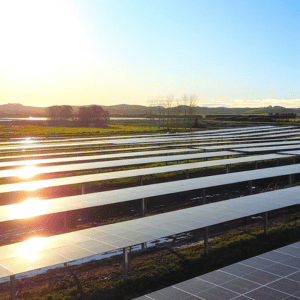SBC recently caught up with David Benattar, The Warehouse Group’s (TWG) Sustainability Lead and SBC Advisory Board member, about TWG’s recent exciting announcement of its historic solar deal with Lodestone Energy, which will see more than 260 sites across the country powered by the sun as early as 2026. Here’s what David had to say.
*Disclaimer: all the language referring to targets, achievements and opinions shared in this blog are those of David Benattar and/or The Warehouse Group.
Q: What motivated you to pursue this solar deal?
A: Our sustainability goals are ambitious, and one of them is to achieve zero emissions in our operations by 2040, with interim targets to 2030 and 2025. Achieving these targets relies in great part on shifting to zero emissions electricity. Being powered by solar means we’re making strides toward that goal years in advance. By the end of December 2026, we anticipate eliminating close to 100% of all our electricity emissions in New Zealand. And the other side of the solar coin is about financial performance. Solar electricity generation is now very competitive and the deal with Lodestone will deliver significant savings compared to our traditional electricity supply.
Q: What makes this partnership between TWG and Lodestone Energy special?
A: This wasn’t your typical business deal, in the sense that Lodestone is a new player in New Zealand energy generation sector. So this partnership is about two Kiwi companies coming together to create something new. This came with its own challenges and learnings, but this also gave us the opportunity to co design an arrangement that gives us the flexibility and financial benefits we were looking for. It’s a win-win for both parties, combining innovation, financial performance and sustainability. We believe this sets an example for others to follow in the transition to clean energy.
Through renewable electricity certificates, we’ll ensure that the electricity we consume matches the solar energy produced by Lodestone’s farms, contributing to New Zealand’s green energy transition.
Q: What made it a project Lodestone was particularly interested in?
A: Lodestone has been very successful in raising capital, building a world class team, and an ecosystem of solar electricity generation. What TWG brought in was a commitment to purchase a significant share of their electricity generation over 20 years, and the willingness to support Lodestone in its initial developments. I suspect this is what made them interested in working with TWG, in addition to the marquis brand name that TWG represents in New Zealand and sustainability.
Q: Why choose solar power over other renewable energy sources?
A: Solar is the perfect fit for us. When our stores are buzzing with activity, the sun is shining its brightest. Plus, falling module costs have made large-scale solar farms not just environmentally friendly but also commercially viable. As we move towards electrification, solar energy is poised to play a pivotal role in New Zealand’s electricity grid, and we want to be at the forefront of this sustainable revolution.
Q: When will you get started and hope to finish?
A: We’ll kickstart the transition of our stores’ electricity supply to Lodestone solar farms late January, with the goal of completing the shift across all our New Zealand sites by the end of December 2026.
Q: ‘Partnership’ is a word we hear often in considering how we will transition to a low emissions and climate resilient future. How important was the partnership between TWG and Lodestone in getting this project off the ground?
A: Co-designing our arrangement with Lodestone was a key part of the program success. We’ve got more than 260 stores from Kaitaia to Invercargill, so we needed a partner who could do more than just keep the lights on, but who also shared our passion for innovation. Collaboration is key in our sustainable journey, and together, we’re driving a greener, more environmentally friendly future.
Q: You mention that this will reduce Scope 2 emissions. What will TWG focus on in Scope 3 emissions, and what are your upcoming sustainability challenges?
A: The deal will remove virtually all of our Scope 2 emissions. This means we can now shift our focus towards accelerating our Scope 3 emission reductions. We have done a significant amount of preparation work on the topic over the past two years, and we are now ready to put the foot down, with a range of initiatives we will be communicating about as we progress on our Scope 3 journey. This will deliver on our vision to bring lower emissions products to New Zealanders and make sustainable and affordable available to all.

